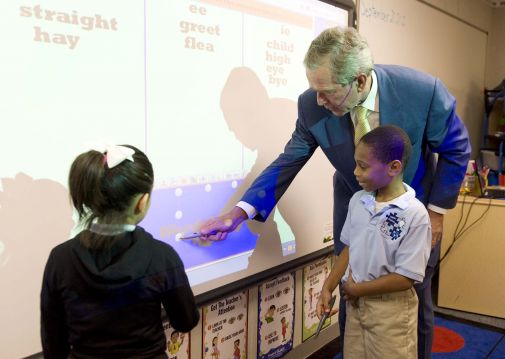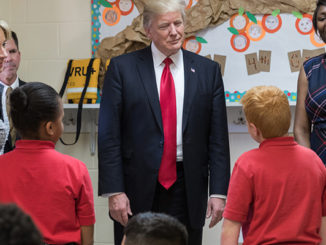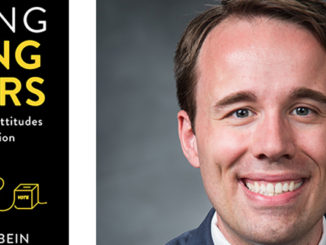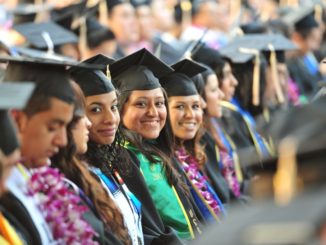
by Kerri L. Briggs
The newly-opened museum of the George W. Bush Presidential Center closes with a video of the 43rd President’s farewell address in which he says this: “I have been blessed to represent this nation we love. And I will always be honored to carry a title that means more to me than any other: citizen of the United States of America.”
I’ve watched five men transition from President of the United States to private citizen and each, along with the former First Ladies, has done so with a distinctive approach. The manner by which President and Mrs. Bush have done so continuously inspires my colleagues and me. Choosing to stay out of the political arena, they have instead focused on pursuing many initiatives central to their lives’ mission of advancing freedom for people throughout the world.
As Director of Education Reform, I am privileged to oversee initiatives that focus on advancing the freedom of America’s children. These efforts are guided by Mrs. Bush’s belief that “to build a more hopeful America, we must help our children as far as their vision and character can take them.” A belief emboldened by President Bush’s conviction “to be truly free, one must be free from ignorance.”
Directed by the same principles that guided President Bush during his time in Office, the Bush Institute’s Education Reform initiatives work to increase student achievement through advancing accountability, redefining school leadership and transforming our nation’s middle schools. Through these three major areas of focus, we seek to better prepare every American student for success in the 21st century and we strive to close the academic achievement gap between minority students and their non-minority peers. Ensuring every child – no matter background, race or socioeconomic status – has the ability to read and write, think critically and communicate and master the basic functions of mathematics is, as President Bush has said, “the great civil rights issue of our time.”
At the heart of our work is the belief that every child can learn to high expectations, and that it is right to hold ourselves accountable for ensuring this belief becomes reality. This principle was the basis of No Child Left Behind, and it is the basis of our work now. To that end, we have an initiative focused on Advancing Accountability. The program advocates for strong accountability systems that promote student learning. As a starting point, we have analyzed the current state accountability systems reflected in a series of federal waivers. Moving forward, we want to ensure that, in the name of flexibility or progress, we do not forget our responsibility to educate every child and that we hold educators and ourselves accountable for achieving that goal.
Accountability done well demands a response to improve schools. Building upon the principle of advancing freedom for our nation’s children, the Bush Institute built on two key themes: leadership and research. Leadership shapes organizational success, which means that principals shape school success. Believing that excellent schools depend on excellent leaders, the Bush Institute developed the Alliance to Reform Education Leadership (AREL) to better prepare and empower our nation’s principals. Research demonstrates that, after teachers, principals are the most important factor to a child’s academic success. As such, AREL is committed to increasing the number of high-quality school leaders able to increase student achievement.
The Bush Institute’s third Education Reform effort is Middle School Matters (MSM). MSM focuses on the crucial middle grades (grades 6-8) where children gain the skills needed to succeed in high school and beyond, by helping schools use research-based principles to improve instruction and schools. The first eight middle schools engaging in this effort with us will be announced soon. Our hope is that these reform efforts will enable our children to stay in school, improve their academic performance and put themselves on paths to success in a 21st century world.
To measure our children’s academic performance today and witness their growth in the future, the Bush Institute developed a Global Report Card (GRC). The GRC allows anyone interested in America’s education systems to access information about U.S. students’ performance against their international peers. It compares students in almost all of America’s 14,000 school districts to students in Germany, Singapore and other industrialized countries. When parents and engaged citizens see how their schools compare both nationally and internationally, they are empowered to become better advocates for our children. To compete in an increasingly global economy, we must teach students the skills necessary to succeed on an international playing field and the GRC serves to magnify our progress toward that end.
One phrase we’ve heard from President Bush quite a lot over these last few years is this: “to whom much is given, much is expected.” As citizens, we have been given much and to pass the torch of economic innovation, security, health, and freedom to our next generation, we must ensure they receive an excellent education. I worked in the U.S. Department of Education when President Bush gave America’s citizens a charge to challenge, “the soft bigotry of low-expectations.” Over a decade later, this challenge is more important than ever. It is my hope you will join the Bush Institute’s Education Reform efforts and strive to spread freedom by increasing our children’s knowledge.
Kerri L. Briggs, Director of Education Reform at The George W. Bush Institute.



